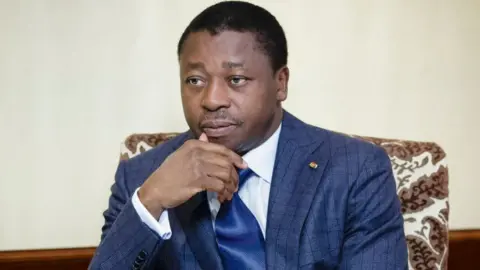Togo constitution: Parliament passes reforms likened to coup
 Getty Images
Getty ImagesTogo's parliament has given final approval to a new constitution extending the president's term, after critics denounced the move as a coup.
The West African country will move from a presidential to a parliamentary system.
President Faure Gnassingbé's supporters argue the changes reduce his powers by transforming the presidency into a ceremonial role.
But the opposition said the reforms remove limits on his stay in office.
Their removal would enable him to remain president until 2031, they said, after which he could be appointed to the new position of "president of the council of ministers" - in effect prime minister - continuing his family's 57-year rule.
President Gnassingbé came to power in 2005 after the death of his father, who had been president since 1967.
The constitutional changes were approved by lawmakers last month. But in the face of mounting public anger, Mr Gnassingbé paused the reforms and said they would be subject to further consultations.
Human Rights Minister Yawa Djigbodi Tségan had said that this move will "improve democracy in the country".
But one-time presidential candidate Brigitte Kafui Johnson, who leads the opposition CDPA party, had described the constitutional amendments as a "power grab".
In recent weeks, pro-government lawmakers have conducted visits around the country they said were intended to "listen to and inform civilians on the constitutional reform".
Customary rulers and selected groups were among the main target of the discussions - but no changes were made as a result.
There has been widespread fear when it comes to expressing views in public in case they are targeted by the authorities in light of police cracking down on anti-government protests.
Last month, an opposition press conference under the banner of "Don't Touch My Constitution" was broken up by police officers armed with truncheons.
